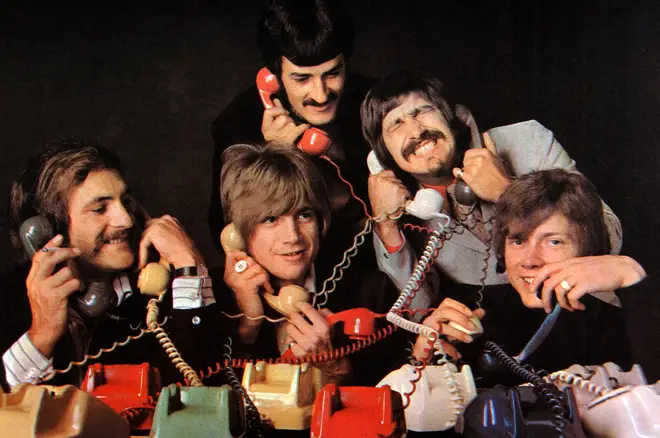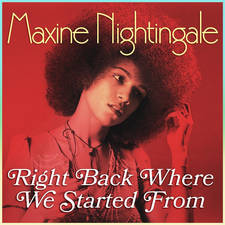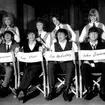The Moody Blues' 10 greatest songs, ranked
5 December 2023, 17:00

Listen to this article
They're one of Britain's most unique rock outfits.
But The Moody Blues were also one of the UK's most unusual exports, a band that veered through various musical territories and influenced countless artists that followed.
This is without perhaps garnering the plaudits they're deserving of, in retrospect, though their rich discography confirms their standing as one of the era's greatest.
There's a valid reason why the Birmingham band went on to sell over 70 million records worldwide throughout their illustrious 54-year existence, which includes 18 platinum and gold-selling albums, alongside eight Top 20 UK charting hits and an induction into the Rock and Roll Hall of Fame in 2018.
- The Moody Blues drummer and co-founder Graeme Edge has died, aged 80
- The Moody Blues' Justin Hayward returns for Jeff Wayne's musical War of The Worlds 2022 UK arena tour
Lauded as creating one, if not the first ever "concept albums" with Days of Future Passed in 1967, they ushered in an entire new age of progressive rock, art rock, and symphonic rock music the subsequent decade.
The Moody Blues also went through various lineup changes, though the classic lineup is considered to be Justin Hayward and John Lodge on vocals, with Mike Pinder, Graeme Edge, and Ray Thomas.
So what are their greatest songs? We've ranked The Moody Blues' best ten from top to bottom:
-
'Ride My See-Saw'

The Moody Blues. Ride My See Saw
Lampooning people who sign up to life's rat race whilst channelling sixties psychedelia at the same time, 'Ride My See-Saw' was one of The Moody Blues' more rampant offerings.
Penned by bassist and vocalist John Lodge, the soaring song thumped harder than any track they'd released to that date.
Though it wasn't a major hit for the band, it showcased their remarkable knack of creating angelic vocal melodies.
-
'The Story In Your Eyes'

The Story In Your Eyes
Despite 'The Story In Your Eyes' being a bonus track from 1971 album, Every Good Boy Deserves Favour, it became its most popular song.
Considered to be one of the band's more intense lyrical displays, the song describes a man concurrently worrying about his marriage/relationship as well as the world around him.
Reaching No.23 on the US Billboard charts, the signature combination of heartfelt vocals, fiery lead guitar and billowing Mellotron makes it one of the band's best.
-
'I Know You're Out There Somewhere'

The Moody Blues - I Know You're Out There Somewhere
The Moody Blues' final charting hit in 1988, 'I Know You're Out There Somewhere' is one of guitarist and singer Justin Hayward's personal favourites.
"I love performing it. Wherever we go, people like it. It wasn't a massive hit, but people know it."
"It wasn't a massive hit because it's about six minutes long and no one did a successful edit on it. That's probably the one that gives me the most pleasure."
Evidently not the only person taking pleasure from the sweeping synth-rock number, with Hayward winning an Ivor Novello Award for his efforts in the following year.
-
'I'm Just a Singer (In a Rock and Roll Band)'

The Moody Blues - I'm Just A Singer (In A Rock And Roll Band)
'I'm Just a Singer (In a Rock and Roll Band)' mirrored the sentiments of The Beatles' John Lennon-penned track 'Glass Onion'.
Ultimately, people looked to rock stars for answers and guidance, when in reality, they themselves didn't have a clue.
Heavily influenced by the images coming out of the Vietnam War, The Moody Blues became disillusioned with life, even their own careers.
It resonated in the US however, reaching No.12 on the Billboard charts.
-
'Gemini Dream'

Gemini Dream
The Moody Blues entered the 1980s intending not to be left behind with the advent of synthesisers, so readily embraced them on their first single that decade in 'Gemini Dream'.
Sounding incredibly Electric Light Orchestra-like, the 1981 song sees songwriters Hayward and Lodge in search of new meaning to life, attempting to escape mundanity.
The song proved the Birmingham could not only adapt to the times, but thrive.
'Gemini Dream' remains one of their most popular offerings from the latter stages of their career, hitting the top 20 of the UK and the US charts.
-
'Isn't Life Strange'

Isn't Life Strange
The first single from 1972 album, Seventh Sojourn, is regarded as a symphonic rock standard.
One of the band's longer odysseys, 'Isn't Life Strange' clocks in at over six minutes yet flies by, showcasing the The Moody Blues' mastery in lush orchestration and soft, Bee Gees-esque harmonisation.
Widely considered as one of John Lodge's finest songwriting efforts, it's progressive pop majesty of the highest calibre.
-
'Tuesday Afternoon'

The Moody Blues - "Tuesday Afternoon" (Official Video)
Written by Justin Hayward, The Moody Blues' singer was fairly glib about how one of the band's finest moments came into being:
"I sat down in a field, smoked a funny African cigarette, and that song just came out. It was a Tuesday afternoon."
From an early age, Hayward made a living from being a musician rather than having a day job to get by, hence being stoned on a Tuesday afternoon with his dog who was aptly named Tuesday.
'Tuesday Afternoon' which featured on Days of Future Passed, showcased the band's unique blend of vocal melody and Mellotron wizardry, which became their signature.
-
'Question'

Moody Blues - Question (1970)
'Question' saw The Moody Blues get political, reflecting the torrid political landscape in the US at the time from the perspective of the generation that embraced the band.
"We were mixing with these people and seeing how different the problems were for them and the issues in being a member of the greatest nation on earth: the United States," Hayward recalled in a later interview.
"How different they were from British people. I was just expressing my frustration around that, around the problems of anti-war and things that really concerned them, and for their own future that they may be conscripted. How that would morally be a dilemma for them."
Aside from the socio-political understanding, 1970's 'Question' was launched into the pantheon of classic rock greats with its iconic acoustic guitar parts and epic drum fills, peaking at number two in the UK charts.
-
'Go Now'

Go Now!
An outlier to their oeuvre, 'Go Now' was a major hit for The Moody Blues in 1964, reaching the top of the UK charts in what was their only number one song.
Though, the poppier offering pre-dated the band's classic era, before Justin Hayward even joined the group.
An obscure soul single sang by Bessie Banks, The Moody Blues got their hands on it with then-singer Denny Laine transforming 'Go Now' into a lovingly pained ballad.
Laine would soon leave the band to be replaced by Hayward, forming his own Electric String Band in 1966, before joining up with Paul McCartney in Wings.
-
'Nights In White Satin'

The Moody Blues - Nights In White Satin (1968)
Justin Hayward penned The Moody Blues' most renowned, and undoubtedly greatest song, at the age of just 19 having only recently joined the group.
"I wrote our most famous song, 'Nights in White Satin' when I was 19. It was a series of random thoughts and was quite autobiographical," he later recalled, having been gifted white satin sheets by a girlfriend.
"It was a very emotional time as I was at the end of one big love affair and the start of another. A lot of that came out in the song."
Not only was 'Nights In White Satin' enormously influential after its 1967 release due to the grandiose orchestration and meaningful, sombre tone, but it has also been given new leases of life in the years since.
It was first re-released in 1972 after The Moody Blues achieved enormous success in the States, reaching number two in the US Billboard charts.
Having been covered by the likes of Giorgio Moroder and classical vocal group Il Divo, 'Nights In White Satin' charted twice again in the UK, both in 1979 and 2010, a testament to the song's enduring quality and timeless appeal.












